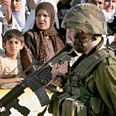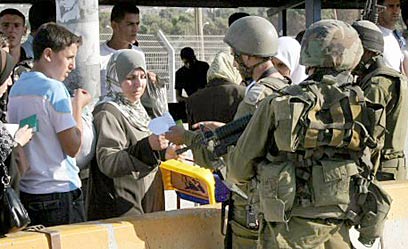
Palestinians suffer from West Bank closure
Full closure on West Bank during Sukkot holiday is nightmare for thousands of Palestinians who can’t get to work in Israel. IDF: Thousands given permits for Ramadan, start of olive harvest
The Sukkot holiday celebrated in Israel this week has turned into a nightmare for many Palestinians because of the full closure on the West Bank, preventing thousands of Palestinians from reaching their workplaces in Israel.
Although the number of Palestinians working in Israel has gone down significantly in the past few years, thousands of West Bank residents still find their source of income in Israel. Gaza residents, on the other hand, have been forbidden entry into Israel since Hamas’ victory in the Palestinian elections.

Hawara checkpoint south of Nablus (Photo: Reuters)
Nasr al-Asqar, a construction worker in the Tel Aviv area, is one of the thousands suffering from the closure. Al-Asqar doesn’t have a permanent workplace, but rather arrives in the Jaffa area daily from Tulkarm, where he hopes that one of the contractors there who hire laborers will choose him. However, even those Palestinian who attain all the permits and manage to enter Israel still run into problems due to competition with the Romanian and Chinese laborers. Sometime al-Asqar goes home empty-handed.
On closure days, Palestinian laborers suffer much more. Al-Asqar explains. “If during the week it happens that one or two days I can’t find employment, it’s a big problem. Sometimes a contractor takes a worker for a few days straight, and if he took a Romanian or Chinese laborer, it means that it’ll be harder for me to find work when the closure is lifted. Likewise, if a contractor wants laborers, he might ask a colleague for recommendations and get recommended the Romanian or Chinese laborers.”
According to al-Asqar, since he cannot finance his three children in Israel, he will be forced to approach the aid funds or his relatives employed within the PA – who themselves have difficulty keeping afloat financially. “How can I ask my family for help? It is clear to all what the salary is from working in the PA – NIS 2,000 per month (roughly USD 490) maximum, for the lucky ones.”
Al-Asqar said the strenuous situation was especially felt during the month of Ramadan, at the end of which Muslims celebrate Id al-Fitr. “I can’t look my children in the eyes when I know they understand the situation. It doesn’t excuse me from the feelings of pain and helplessness. My children know that when dad doesn’t work, the holiday won’t be the same.
“I hope that between the end of Sukkot and our holiday that there a re a few days (of work) so I can still manage to buy the kids a new outfit and earn enough to celebrate properly. Our lives haven’t been fit for humans for a long time now. Only someone who faces looking into his children’s eyes every day and the sight of the shortages at home can know what I mean.”
Surviving on charity
But if al-Asqar’s situation still seems reasonable, in Palestinian terms, considering the fact that he manages to find work in Israel a few days each month, Ahmad Abu Saada from Gaza has it much harder.
Abu Saada, father of five, who worked in construction and agriculture in Israel, hasn’t earned a single shekel in the past six months. “Since Hamas was elected, I haven’t gone in to work in Israel a single day. Our lives depend on meals from UNRWA and other humanitarian funds,” he says.
According to Abu Saada, the financial situation during Ramadan this year has been worse than any year previous – even worse than during the Intifada. But despite his difficult situation, he still doesn’t blame the Hamas government. “Even before Hamas rose to power, our situation wasn’t much better. Even then, our entry into Israel was prevented, and there was a different excuse every time.”
IDF: Thousands given permits
In the past few months, as a result of the Ramadan fast and the beginning of the olive harvest, Israel started to ease restrictions on the Palestinians.
Season of olive harvest starting (Photo: Elad Gershgorn)
The Civil Administration said 2,000 Palestinian workers were given permits for the persimmon-picking season in Israel, 200 of which included overnight stays. 300 Palestinians aged 25 and up were given work permits in the field of tourism, and 20 were given permits to work events run by the nature reserves and parks authorities.
For the occasion of Ramadan, Israel allowed men over 45 and women over 40 to freely enter Israel for Friday services at the Temple Mount, with no need for special permits. Last Friday 107,000 Palestinians entered Israel, while the Friday before 29,000 entered.
Last month some 5,000 Palestinians received medical treatment in Israel, and 10 left for medical treatments abroad. During the holiday the PA and Israeli security forces coordinated emergency transfer of casualties to Israeli hospitals following the recent violence between Hamas and Fatah. According to assessments, 80,000 Palestinians will receive medical treatment in Israel by the end of the year.
For the opening of the olive harvest, 18,000 work permits were given for work along the seam line. Another 3,000 permits were given for harvests within Israel.
The IDF noted that “the Civil Administration and Central Command are fully ready for the olive harvest and are briefing forces in the field.










